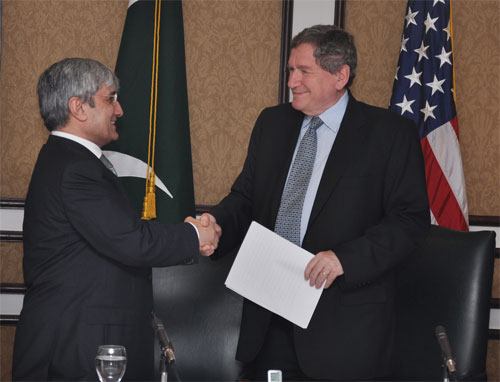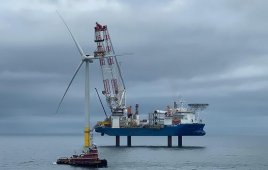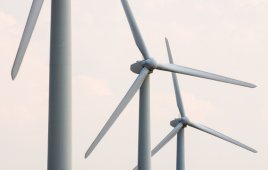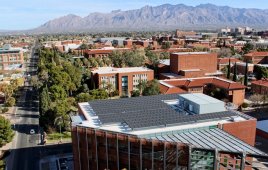The United States and Pakistan, together with American power company AES Corporation, have agreed to create a partnership to develop a $375 million wind power generation project in the Gharo Corridor of Pakistan.

U.S. Special Representative for Afghanistan and Pakistan Ambassador Holbrooke and Pakistan Ministry of Water and Power Secretary Javed Iqbal shake hands after signing an agreement to develop a 150-MW, $375 million wind power generation project. -islamabad.usembassy.gov
The 150-MW project will help reduce Pakistan’s dependence on imported fuel, saving Pakistani citizens $45 million a year.
“This project represents a meaningful, environmentally sound step toward addressing Pakistan’s energy crisis,” says Ambassador Richard C. Holbrooke, U.S. Special Representative for Afghanistan and Pakistan. “Partnership with the private sector will also demonstrate the potential of investing in the power sector in Pakistan.”
This agreement is a concrete outcome of the U.S.-Pakistan Strategic Dialogue. At the last meeting of the Dialogue on October 22 in Washington, DC, U.S. Secretary of State Hillary Rodham Clinton announced progress toward developing a public-private partnership to “draw on the potential of winds that blow down the Pakistani coastline.” The energy working group of the Strategic Dialogue was created to respond to Pakistan’s needs in this sector, which is critical to Pakistan’s economic and social development.
The partnership features investments from the Government of Pakistan and AES, which will leverage a loan from the Overseas Private Investment Corp. (OPIC) to develop wind power generation sites. The Government of Pakistan, represented by the Ministry of Water and Power, will own a minority stake in the project through a grant from the United States Agency for International Development (USAID). The Pakistani government’s shares will be privatized over time, and proceeds from the privatization will finance future energy projects.
Other energy sector outcomes of the Strategic Dialogue include USAID programs to rehabilitate 3 thermal power plants (Jamshoro, Muzaffargarh and Guddu) and the Tarbela Dam power station, complete the Gomal Zam and Satpara dams, improve the efficiency of tubewell pumps, support electricity distribution companies, and promote efficient energy use.
The agreement was signed by USAID Pakistan Mission Director Andrew Sisson, Pakistan Ministry of Water and Power Secretary Javed Iqbal, AES Country Director Iqbal Sheikh, and Ambassador Holbrooke on behalf of the U.S. Overseas Private Investment Corporation (OPIC). U.S. Ambassador to Pakistan Cameron Munter and Arif Alauddin, Chairman of Pakistan’s Alternative Energy Development Board, also participated.
Filed Under: Policy




